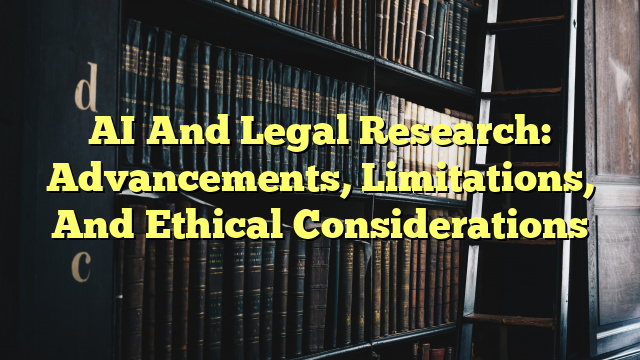Table of Contents
- Advancements in AI and Legal Research
- Limitations of AI in Legal Research
- Ethical Challenges of AI in Legal Practice
- Four Ethical Issues Related to AI
Advancements in AI and Legal Research
In recent years, artificial intelligence (AI) has been making tremendous leaps in the legal research field. AI is being used to automate a variety of tasks in the legal industry, from assisting lawyers in understanding cases to helping with document review. AI can also be used to predict the outcomes of cases based on historical data. There are many potential applications of AI in the legal field, and the possibilities are only increasing.
One of the most promising applications of AI in legal research is the development of legal information retrieval systems. These systems use AI to search through large collections of case law, statutes, and regulations to find relevant information quickly and accurately. By automating the task of legal research, these systems can greatly reduce the amount of time and effort required to research the law.
AI can also be used to assist lawyers in understanding legal cases. AI-powered systems can analyze legal documents and extract key concepts and insights. This can help lawyers better understand the implications of a case and make more informed decisions.
Limitations of AI in Legal Research
Despite the potential of AI in legal research, there are several limitations that need to be taken into consideration. The development of AI-powered legal research systems is still in its early stages, and the accuracy of these systems can be limited. Additionally, AI-powered systems are only as good as the data that is fed into them. If the data is inaccurate or outdated, then the results of the search will be flawed.
Furthermore, AI-powered legal research systems are only as effective as the legal experts who are using them. AI-powered systems can provide an initial starting point for legal research, but they cannot replace the expertise and insight of a trained legal professional.
Ethical Challenges of AI in Legal Practice
The use of AI in legal research raises several ethical issues that need to be considered. One of the most pressing ethical considerations is the potential for bias in AI-powered legal research systems. If the data that is being used to train the system is biased, then the results of the research will be biased. This could lead to unfair outcomes in legal proceedings.
Additionally, the use of AI in legal research could potentially lead to the displacement of human workers, such as legal researchers and paralegals. This could lead to an increase in unemployment and a decrease in job opportunities.
Four Ethical Issues Related to AI
The use of AI in legal research raises several ethical issues that need to be considered, including:
- Bias: AI-powered legal research systems can be biased if the data that is used to train the system is biased.
- Displacement of Human Workers: The use of AI in legal research could lead to the displacement of human workers, such as legal researchers and paralegals.
- Data Privacy: AI-powered legal research systems could potentially access and store sensitive legal data, raising concerns about data privacy and security.
- Accountability: AI-powered systems can make decisions that could have serious legal consequences. It is unclear who will be held accountable for these decisions.
Overall, the use of AI in legal research has the potential to improve the efficiency and accuracy of legal research. However, there are several ethical issues that need to be taken into consideration when using AI in the legal field. It is important to consider the potential implications of AI in legal research and ensure that the use of AI is employed responsibly.

